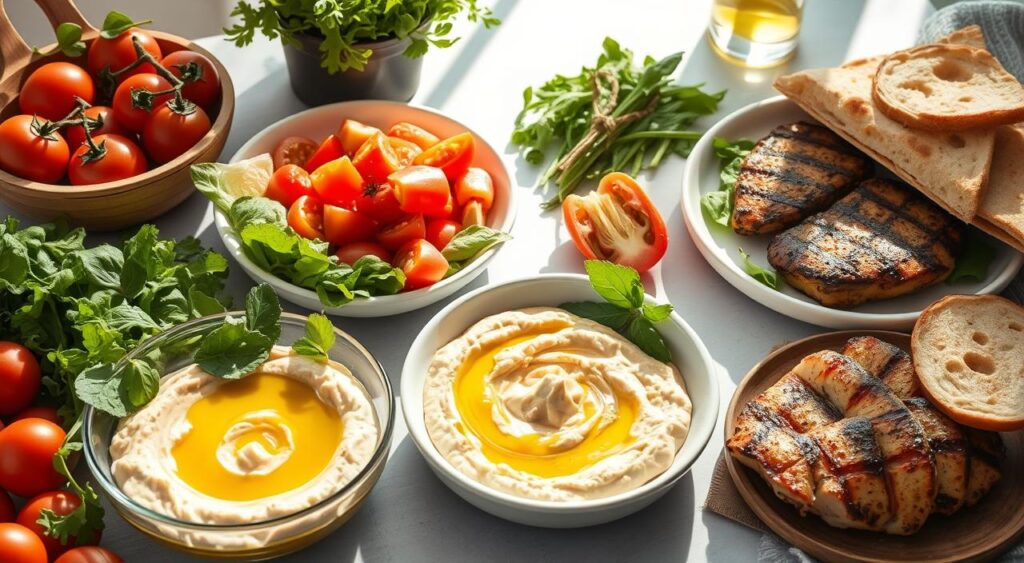Discover the power of the Mediterranean Diet in supporting your overall health and wellbeing. By incorporating gut-friendly foods into your daily meals, you can accelerate your weight loss journey and improve your overall wellness.
The Mediterranean Diet has gained significant attention for its dual benefits of supporting gut health and facilitating weight loss. Your gut health plays a crucial role in weight management, immune function, and even mental health. By focusing on prebiotic-rich foods and anti-inflammatory compounds, you can nurture your gut microbiome and achieve your weight loss goals.
Key Takeaways
- The Mediterranean Diet supports a healthy balance of gut microbiota.
- Gut-friendly foods can accelerate your weight loss journey.
- The diet provides an ideal blend of nutrients for overall health.
- Prebiotic-rich foods and anti-inflammatory compounds nurture your gut microbiome.
- A healthy gut microbiome is crucial for weight management and overall wellness.
The Mediterranean Diet and Gut Health Connection
Exploring the relationship between the Mediterranean diet and gut health reveals a complex interplay that influences your overall health and weight. The Mediterranean diet is renowned not only for its weight management benefits but also for its positive impact on your gut microbiome.

What Makes the Mediterranean Diet Special
The Mediterranean diet stands out due to its emphasis on whole, nutrient-dense foods that naturally support a healthy balance of gut bacteria. By focusing on fruits, vegetables, whole grains, and healthy fats, this diet helps maintain a robust gut barrier, preventing conditions like “leaky gut” that can lead to systemic inflammation and metabolic disorders.
- Rich in fiber, which promotes the growth of beneficial gut bacteria.
- High in antioxidants, reducing oxidative stress and inflammation.
- Includes healthy fats like olive oil, which have anti-inflammatory properties.
How Gut Health Influences Weight Management
Your gut microbiome plays a crucial role in how your body processes and stores calories, directly impacting your weight management efforts. Certain gut bacteria can either promote weight gain or facilitate weight loss by influencing how efficiently you extract energy from food. An imbalanced gut microbiome can trigger inflammation, linked to insulin resistance and increased fat storage.
The Science Behind Mediterranean Diet for Weightloss
The Mediterranean diet’s effectiveness for weight loss is backed by a wealth of scientific research. This dietary approach has been extensively studied, and the evidence supports its benefits for weight management.
Anti-Inflammatory Properties
The Mediterranean diet is rich in anti-inflammatory foods, such as fruits, vegetables, and healthy fats, which help reduce inflammation in the body. Chronic inflammation is associated with various health issues, including obesity. By incorporating anti-inflammatory foods, you can potentially improve your overall health and support weight loss.

Balanced Macronutrients and Fiber Content
A key factor in the Mediterranean diet’s success is its balanced composition of macronutrients and high fiber content. The diet emphasizes whole grains, legumes, and a variety of fruits and vegetables, providing a feeling of fullness and satisfaction. This balance helps you maintain a healthy calorie intake while supporting overall nutritional well-being.
Research-Backed Weight Loss Benefits
Numerous studies have demonstrated the Mediterranean diet’s effectiveness for weight loss. Research from the PREDIMED study showed that participants on the Mediterranean diet not only lost weight but also reduced visceral fat, a dangerous type of fat that surrounds internal organs. The diet’s high satiety factor and balanced nutrient profile contribute to its success in promoting sustained weight loss.
9 Powerful Mediterranean Foods for Optimal Gut Health
Discover the transformative power of the Mediterranean diet’s top foods that are specifically beneficial for maintaining a healthy gut. The Mediterranean diet is not just a dietary choice; it’s a pathway to achieving optimal gut health through its diverse and nutrient-rich foods.

Extra Virgin Olive Oil: The Foundation of Gut Health
Extra virgin olive oil is a staple in the Mediterranean diet, renowned for its anti-inflammatory properties that support gut health. Rich in antioxidants, it helps reduce inflammation and promote a balanced digestive system.
Greek Yogurt and Fermented Foods
Greek yogurt and other fermented foods are rich in probiotics, which are beneficial bacteria that enhance gut health. These foods support digestion and contribute to a robust immune system.
Fiber-Rich Legumes and Beans
Legumes and beans are high in fiber, which is crucial for maintaining a healthy gut. They promote regular bowel movements and support the growth of beneficial gut bacteria, aiding in digestion.
Whole Grains for Digestive Support
Whole grains are an essential component of the Mediterranean diet, providing fiber and nutrients that support gut health. They help in maintaining a healthy gut microbiome and preventing digestive disorders.
Nuts and Seeds for Prebiotic Benefits
Nuts and seeds are not only a tasty snack but also rich in prebiotic fibers that feed the good bacteria in the gut, promoting a healthy gut microbiome. They are a great addition to a Mediterranean diet for enhancing gut health.
Fatty Fish Rich in Omega-3s
Fatty fish, such as salmon and sardines, are rich in omega-3 fatty acids, which reduce inflammation and support heart health. They also contribute to a balanced gut by reducing inflammation in the digestive tract.
Colorful Vegetables and Antioxidants
Colorful vegetables are packed with antioxidants and fiber, making them a crucial part of the Mediterranean diet for gut health. They help in reducing oxidative stress and promoting a healthy gut.
Fresh Fruits and Natural Sugars
Fresh fruits are a natural source of sugars and are rich in fiber and antioxidants. They support gut health by providing prebiotic fibers that help in the growth of beneficial gut bacteria.
Herbs and Spices with Digestive Benefits
Herbs and spices like turmeric, ginger, and oregano are not just flavor enhancers but also have potent digestive benefits. They contain anti-inflammatory compounds that soothe the digestive tract and support gut health. Incorporating a variety of herbs and spices into your diet can significantly enhance your digestive well-being.
By incorporating these nine powerful foods into your diet, you can significantly improve your gut health, reduce inflammation, and support overall well-being. The Mediterranean diet offers a delicious and sustainable way to achieve optimal health.
How to Transition to a Mediterranean Diet
Transitioning to a Mediterranean diet can be a straightforward process if you know where to start. This dietary approach emphasizes whole grains, fruits, vegetables, and healthy fats, making it a balanced choice for overall health.
Gradual Changes vs. Complete Overhaul
When adopting the Mediterranean diet, you can choose between making gradual changes or a complete overhaul of your eating habits. Starting with small adjustments, like replacing your usual cooking oil with extra virgin olive oil, can make the transition smoother.
Foods to Increase and Foods to Limit
Focus on increasing your intake of whole grains, vegetables, and fruits. Incorporate more fish and nuts into your meals. Conversely, limit your consumption of processed foods and sugars. A well-stocked pantry with yogurt, canned beans, and a variety of vegetables will make meal preparation easier.
Shopping List Essentials
Creating a shopping list is crucial for a successful transition. Prioritize fresh produce, whole grains, and healthy fats. Here’s a sample table to help you get started:
| Food Category | Examples |
|---|---|
| Fruits and Vegetables | Leafy greens, Berries, Citrus fruits |
| Whole Grains | Quinoa, Brown rice, Whole wheat bread |
| Protein Sources | Salmon, Sardines, Greek yogurt |
| Healthy Fats | Olive oil, Nuts, Seeds |

By focusing on these food categories and making a few simple changes, you can successfully transition to the Mediterranean diet and enjoy its numerous health benefits.
Creating a Gut-Friendly Mediterranean Meal Plan
Crafting a Mediterranean meal plan that supports gut health is easier than you think. By incorporating the right foods and balancing your meals, you can improve your digestive health and overall well-being.
Balanced Breakfast Options
Starting your day with a balanced breakfast is crucial. Consider options like Greek yogurt with fresh fruits and nuts, or whole-grain toast with avocado and eggs. These meals provide a mix of protein, healthy fats, and complex carbohydrates to keep you full and support gut health.
Satisfying Lunch Ideas
For lunch, opt for meals that combine protein, fiber, and healthy fats. Grilled chicken or fish with roasted vegetables and quinoa is an excellent choice. Alternatively, a hearty salad with legumes, nuts, and a citrus vinaigrette dressing can be very satisfying.
Nutritious Dinner Combinations
Dinner should include a balance of nutrients as well. Try pairing grilled meats or fish with a variety of colorful vegetables and whole grains like brown rice or farro. This balance supports gut health and provides essential nutrients.
Healthy Snacks and Desserts
Snacking on Mediterranean-inspired options can help maintain stable blood sugar levels. Choose snacks like a handful of unsalted nuts and seeds, fresh fruit, or nonfat Greek yogurt with a drizzle of honey. For desserts, consider Greek yogurt with cinnamon or a small piece of dark chocolate. These options are not only delicious but also support gut health.
| Meal | Options | Benefits |
|---|---|---|
| Breakfast | Greek yogurt with fruits and nuts | High in protein and fiber |
| Lunch | Grilled chicken with roasted vegetables | Rich in protein and antioxidants |
| Dinner | Grilled fish with quinoa and vegetables | Balanced nutrients and omega-3 fatty acids |
| Snacks | Nuts, seeds, and fresh fruits | Healthy fats, protein, and fiber |

7-Day Mediterranean Diet Meal Plan for Weight Loss
Embarking on a 7-day Mediterranean diet meal plan can be a transformative experience for your gut health and weight loss journey. This structured plan helps you stay on track while exploring the rich flavors and nutritional benefits of the Mediterranean diet.
Days 1-3: Getting Started
Begin your journey with a focus on whole grains, fruits, and vegetables. Sample meals include oatmeal with fresh berries and nuts for breakfast, a Greek salad with grilled chicken for lunch, and roasted salmon with quinoa and steamed broccoli for dinner. Emphasize portion control and mindful eating to get into the Mediterranean diet rhythm.
Days 4-7: Building Momentum
As you progress, incorporate more variety into your meals. Try a hearty lentil soup for lunch, snack on hummus with carrot sticks, and enjoy a dinner of grilled turkey with roasted vegetables and brown rice. Experiment with herbs and spices to add flavor without extra salt or sugar.
Grocery List and Prep Tips
To make your 7-day meal plan a success, prepare a comprehensive grocery list organized by store sections. Batch prepare components like roasted vegetables and homemade hummus on the weekend. 
- Prepare a grocery list to streamline shopping.
- Batch prepare certain components on the weekend.
- Wash and chop vegetables in advance to boost fiber intake.
- Portion nuts, seeds, and olives into small containers.
- Invest in quality storage containers for freshness.
By following these tips and sticking to your 7-day Mediterranean diet meal plan, you’ll be well on your way to achieving your weight loss goals while nourishing your gut health.
Common Challenges and How to Overcome Them
As you embark on your Mediterranean diet journey, you may encounter several challenges that can be overcome with the right strategies. The key to success lies in understanding these common obstacles and preparing effective solutions.
Dining Out While Following the Mediterranean Diet
Dining out can be challenging when following the Mediterranean diet, but it’s not impossible. You can still enjoy Mediterranean-inspired meals at restaurants by choosing dishes rich in vegetables, lean proteins, and whole grains. Opt for grilled fish or chicken, and ask for olive oil on the side. Be mindful of portion sizes and avoid processed foods. When in doubt, don’t hesitate to ask your server about the ingredients used in the dish.
| Dining Out Tips | Choices to Make | Choices to Avoid |
|---|---|---|
| Appetizers | Hummus with vegetables | Fried calamari |
| Main Course | Grilled salmon with quinoa | Breaded and fried chicken |
| Desserts | Fresh fruit | Cakes and pastries |
Managing Cravings and Adaptation Period
The adaptation period is a critical phase when transitioning to the Mediterranean diet. It’s common to experience cravings, especially for processed foods and added sugars. To manage these cravings, have Mediterranean-compliant alternatives ready. For instance, try Greek yogurt with honey when craving ice cream, or homemade popcorn with olive oil and herbs when wanting chips. Gradually increasing your fiber intake and staying hydrated can also minimize digestive adjustments.
- Have healthy alternatives on hand to manage cravings.
- Gradually increase fiber intake to minimize digestive discomfort.
- Stay hydrated to support overall digestive health.

Tracking Your Progress: Beyond the Scale
To fully appreciate the benefits of the Mediterranean diet, you need to look beyond the scale. While weight loss is a significant aspect, the diet offers numerous other advantages that contribute to your overall well-being.
Digestive Improvements to Watch For
As you adopt the Mediterranean diet, you may notice significant improvements in your digestive health. This can include reduced bloating, more regular bowel movements, and an overall sense of comfort in your digestive system. These changes are largely due to the diet’s emphasis on fiber-rich foods, fermented products, and healthy fats.
Energy, Mood, and Other Non-Scale Victories
Beyond digestive health, the Mediterranean diet can lead to various non-scale victories. You might experience increased energy levels throughout the day, improved mood stability, and enhanced mental clarity. Additionally, many people report clearer skin, stronger nails, and shinier hair as their body benefits from the nutrient-dense foods and reduced inflammation. These changes reflect the diet’s positive impact on your overall health and well-being.

Additional Health Benefits of the Mediterranean Diet
Beyond weight loss, the Mediterranean diet offers numerous additional health benefits that can transform your overall well-being. This eating pattern has been extensively researched, and the results are compelling.
Heart Health and Reduced Disease Risk
The Mediterranean diet is known for its positive impact on heart health. Research has indicated that it can help prevent heart attacks, stroke, and type 2 diabetes, reducing the risk of premature death. By incorporating foods rich in omega-3s, antioxidants, and fiber, you can significantly lower your risk of chronic diseases.
- Reduces the risk of heart disease and stroke
- Helps manage blood sugar levels
- Lowers blood pressure
Longevity and Quality of Life
The Mediterranean diet is associated with increased longevity and healthier aging. Studies have shown that adherence to this diet is linked to longer telomeres, suggesting a slower cellular aging process. Additionally, the diet’s anti-inflammatory properties help protect against age-related cognitive decline.
- Increases longevity and healthier aging
- Slows cellular aging processes
- Reduces the risk of Alzheimer’s disease by up to 40%
Conclusion
The Mediterranean diet stands out as a balanced and enjoyable approach to achieving weight loss and enhancing gut health. By incorporating the nine powerful foods that support gut health—such as olive oil, Greek yogurt, legumes, whole grains, nuts and seeds, fatty fish, colorful vegetables, fresh fruits, and beneficial herbs and spices—you create an internal environment that naturally supports weight management.
Unlike many restrictive diet plans, the Mediterranean diet emphasizes abundance, variety, and pleasure in eating while still creating the calorie deficit needed for weight loss. This approach not only facilitates weight loss but also provides numerous health benefits, including better digestion, increased energy, reduced disease risk, and improved longevity.
As you begin your Mediterranean diet journey, remember that consistency matters more than perfection. Small, sustainable changes to your eating patterns will yield greater long-term results than dramatic but unsustainable overhauls. By adopting this diet, you’re not just losing weight; you’re gaining health, vitality, and a positive relationship with food that can last a lifetime.
FAQ
What are the key components of a Mediterranean-style eating plan?
A Mediterranean-style eating plan emphasizes whole grains, fruits, vegetables, lean protein sources like poultry and fish, and healthy fats, such as those found in extra virgin olive oil.
How does the Mediterranean Diet support gut health?
The Mediterranean Diet supports gut health by incorporating fermented foods like Greek yogurt, which contain probiotics, and prebiotic-rich foods like legumes, whole grains, and nuts, promoting a balanced gut microbiome.
Can I still eat meat on the Mediterranean Diet?
While red meat is consumed in limited amounts, you can still enjoy lean protein sources like chicken and fish, which are staples in the Mediterranean Diet.
How can I reduce my intake of added sugars on the Mediterranean Diet?
Focus on whole, unprocessed foods like fruits, vegetables, and whole grains, and limit your consumption of processed foods and sweetened beverages to reduce your intake of added sugars.
Are there any specific foods that can help with weight loss on the Mediterranean Diet?
Foods high in fiber, such as legumes and whole grains, and those rich in healthy fats, like nuts and extra virgin olive oil, can help promote feelings of fullness and support weight loss.
How can I make the Mediterranean Diet a sustainable part of my lifestyle?
Start by making gradual changes to your eating habits, incorporating more whole foods and healthy fats, and limiting your intake of processed foods and added sugars.
Can I drink wine on the Mediterranean Diet?
Moderate wine consumption, typically defined as up to one glass per day for women and up to two glasses per day for men, is a characteristic of the Mediterranean Diet, but it’s not required.
How can I track my progress on the Mediterranean Diet?
Monitor your digestive health, energy levels, and overall well-being, and track your weight loss progress, if that’s a goal for you.



